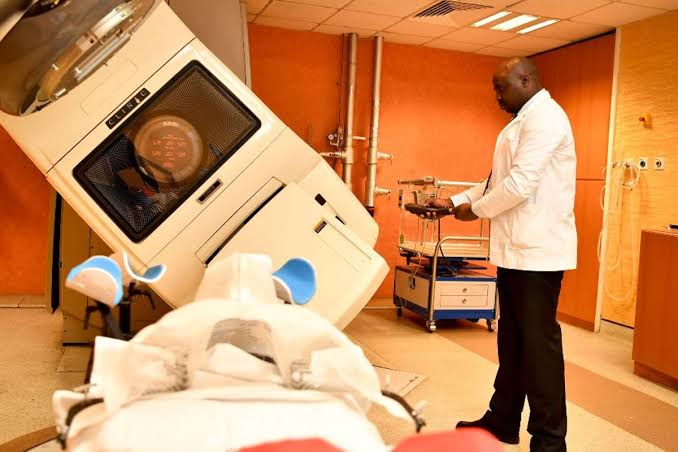Kenyans suffering from Cancer from eight counties will now get Radiotherapy services at the Nakuru- Level 6- A Hospital once a Sh.500 million state-of-the-art unit becomes operational next year in February.
Governor Lee Kinyanjui of Nakuru county has said the key objective of the project funded by the national government and implemented by the county government under the Universal Health Coverage initiative will be to provide quality, medically accurate and up-to-date advanced radiotherapy services to cancer patients from Bomet, Kericho, Nakuru, Baringo, Nyandarua, Laikipia and Samburu counties.
“We want to reduce the health risks related to traveling long distances to access radiotherapy services elsewhere, including the cost of transport and time taken before one is attended to due to unavailability of the facility locally,” he stated. “Currently, the only public health institutions where cancer patients seek radiotherapy treatment are Kenyatta National Hospital (KNH) in Nairobi and the Moi Teaching and Referral Hospital (MTRH) in Eldoret. The costs are very high in a few private hospitals in Nairobi that offer the cancer curative sessions.”
The proposed radiotherapy centre sits on a 4-acre piece of land hived off from the Kenya Medical Training Centre (KMTC).
Kinyanjui says lack of a cancer database has made it hard to establish the exact figures of those suffering from the condition saying the country relied on statistics mainly picked from Nairobi, Kijabe and Moi Teaching Referral Hospital registries.
According to World Health Organization’s cancer research agency Globocan, Oesophagus cancer remains the top killer in Kenya.
The governor also said that timely dissemination of cancer surveillance data to the policy makers and scientists responsible for designing, implementing, and evaluating cancer prevention and control activities is vital.
“Africa needs accurate cancer data for planning and prioritizing resources, exploring trends in cancer care, creating regional and state benchmarks for participating hospitals, and to serve as the basis for quality improvement,” he said.
The County Executive Committee Member for Health, Dr. Zachary Gichuki says the Radiotherapy centre will act as a backup for the oncology complex that has been screening and treating cancer cases since last year.
“We are already offering cancer patients chemotherapy services at the now fully operational oncology unit. Those requiring chemotherapy treatment no longer travel to Kenyatta National Hospital (KNH) and the Moi Teaching and Referral Hospital (MTRH) Eldoret,” says Gichuki.
“The unit has 10 chemotherapy seats and is manned by an oncologist, a medical officer, a pharmacist, four nurses and a physiotherapist. It has a capacity to serve at least 30 patients. In the past four months 2,156 patients have been received at the unit,” explains Dr Gichuki.
The proposed Radiotherapy centre will be used for training medical students from KMTC, Egerton University and Kabarak University.
“This is a public project being conducted by the County and National governments. Last year’s launch of the oncology unit and the ongoing construction of the radiotherapy centre is meant to decongest Kenyatta National Hospital and the Moi Teaching and Referral Hospital of the long queues of cancer patients,” says the CEC.
“Completion of this unit will make Nakuru the third town to offer this service in Kenya after Nairobi and Eldoret counties,” says Dr. Gichuki
Kenya has the highest number of cancer-related deaths across East Africa, according to new data by the World Health Organization (WHO).
Cancer kills 32,987 Kenyans a year, an estimated 40 per cent of the 83,426 deaths reported in the three East Africa countries of Kenya, Uganda and Tanzania, according to the World Health Organization’s Globocan report that analyses new cases among men and women.
The Globocan 2018 findings show that 47,887 Kenyans get cancer every year as 32,987 die from the disease. The most common remains breast cancer with 5,985 women and men diagnosed every year compared to 2,864 prostate cases.
According to the National Cancer Control Strategy 2017-2022, launched by the Ministry of Health two years ago there is urgent need to develop standardized data collection tools so as to increase access to evidence based information on cancer prevention, screening and early diagnosis.
Kenya Insights allows guest blogging, if you want to be published on Kenya’s most authoritative and accurate blog, have an expose, news TIPS, story angles, human interest stories, drop us an email on [email protected] or via Telegram

 Business5 days ago
Business5 days ago
 Business5 days ago
Business5 days ago
 Business2 weeks ago
Business2 weeks ago
 News2 weeks ago
News2 weeks ago
 Politics1 week ago
Politics1 week ago
 News2 days ago
News2 days ago
 Investigations4 days ago
Investigations4 days ago
 Business2 weeks ago
Business2 weeks ago

















